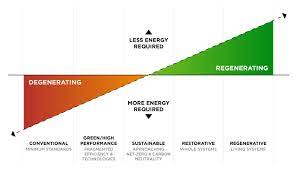The Power of Regenerative Practices in Agriculture
In recent years, the concept of regenerative agriculture has gained significant attention as a sustainable solution to combatting environmental degradation and improving soil health. Unlike conventional farming methods that often deplete the soil and rely heavily on chemical inputs, regenerative practices focus on restoring and revitalizing the land through natural processes.
One key aspect of regenerative agriculture is soil health. By utilizing techniques such as cover cropping, crop rotation, and minimal tillage, farmers can improve soil structure, increase organic matter content, and enhance biodiversity below ground. Healthy soils not only support robust plant growth but also sequester carbon from the atmosphere, helping to mitigate climate change.
Another important component of regenerative agriculture is water management. By implementing strategies like rainwater harvesting, contour plowing, and agroforestry, farmers can reduce water runoff, prevent erosion, and improve water retention in the soil. These practices not only benefit crop yields but also contribute to watershed health and overall ecosystem resilience.
Biodiversity is also a central tenet of regenerative agriculture. By diversifying crops, incorporating native plants, and creating habitat for beneficial insects and wildlife, farmers can promote ecological balance and reduce the need for synthetic pesticides or fertilizers. This approach fosters a more resilient agroecosystem that can adapt to changing environmental conditions.
Ultimately, regenerative agriculture offers a holistic approach to food production that prioritizes the long-term health of the land, communities, and ecosystems. By embracing regenerative practices, farmers can create thriving agricultural systems that not only sustainably produce food but also regenerate the natural resources on which we all depend.
Understanding Regeneration: Exploring the Meaning, Ways, and Terminology of Renewal and Restoration
- What is meant by term regeneration?
- What does regenerative way mean?
- What is the word for regenerative?
- What does it mean to regenerate?
What is meant by term regeneration?
Regeneration, in the context of regenerative practices, refers to the process of restoring and revitalizing ecosystems, soil, and communities through sustainable and holistic approaches. It involves nurturing the natural capacity of the land to heal and thrive by promoting biodiversity, enhancing soil health, conserving water resources, and fostering resilience in the face of environmental challenges. Regeneration goes beyond mere sustainability by actively seeking to improve the health and vitality of our planet for future generations.
What does regenerative way mean?
The term “regenerative” refers to a holistic approach that aims to restore, renew, and revitalize ecosystems, communities, and economies. In the context of agriculture, a regenerative way signifies farming practices that focus on enhancing soil health, promoting biodiversity, and improving overall ecosystem resilience. By utilizing techniques such as cover cropping, crop rotation, and agroforestry, regenerative agriculture seeks to create sustainable food production systems that not only nourish the land but also contribute to environmental sustainability and social well-being. Embracing a regenerative way means prioritizing the health of the planet and future generations by working in harmony with nature to create lasting positive impacts.
What is the word for regenerative?
The term commonly used to describe regenerative practices in agriculture and sustainability is simply “regenerative.” It signifies a holistic approach focused on restoring and revitalizing the land through natural processes, promoting soil health, biodiversity, and ecosystem resilience. Embracing regenerative principles can lead to sustainable food production, carbon sequestration, and overall environmental regeneration.
What does it mean to regenerate?
To regenerate means to restore, renew, or revive something to a healthier or more vibrant state. In the context of regenerative practices, it refers to the intentional and sustainable process of revitalizing ecosystems, soils, and communities through natural methods. By focusing on building resilience, promoting biodiversity, and enhancing ecosystem services, regenerative approaches aim to create lasting positive impacts on the environment while fostering sustainable relationships between humans and nature.

